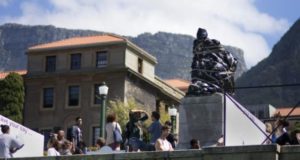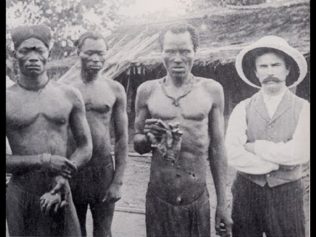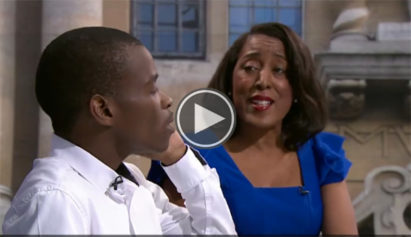
Colonizer Cecil John Rhodes is covered in plastic bags last month as part of a protest by students of the University of Cape Town. Photograph: Rodger Bosch/ AFP/Getty
Over the past two weeks, a race debate has erupted in South Africa with a speed and intensity that has rarely been seen since the first democratic election in 1994. Some fear it could mark the beginning of a race war if not handled carefully.
Unusually, the controversy does not relate directly to apartheid; its origins predate that regime. It has been triggered by a statue of the British colonialist and mining magnate Cecil John Rhodes on the campus of the University of Cape Town.
On March 10th, Chumani Maxwele and 12 other Black students at the university threw human excrement over the statue of Rhodes, whose endowment in 1918 led to the foundation of the university.
The prominently-placed Rhodes statue looks out over the university and its 26,000 students, about half of whom are Black. Pointing to Rhodes’s land and mineral grabs in the early 20th century, the group of students demanded that the statue of Rhodes, and other colonial symbols, be removed.
Controversy about divisive public symbols is not unusual in South Africa. After the 1994 election, the newly-elected parliament removed oil paintings of previous prime ministers. The names of buildings and streets were changed, and many statues removed. This happened even at the Afrikaans universities, which were more conservative and had provided intellectual and theological support to the apartheid government.
The English universities – historically anti-apartheid and liberal – had less to prove. Thus, only now, 21 years after the democratization of South Africa, are they being forced by the actions of one student to deal with their divisive symbols.
‘Rhodes must fall’
Following the “poo protest”, as it has become known, the “Rhodes must fall” movement was formed by like-minded students. Protest marches and meetings quickly spread to other historically English universities. Students raised not only the issue of colonial symbols, but also of institutional racism and a lack of transformation at these universities.
The students also highlight racial incidents at campuses around South Africa. Last month, a Black student at Stellenbosch University was beaten unconscious after trying to intervene when white students racially abused Black restaurant workers.
At the University of Cape Town a young white male was accused of racially abusing and then urinating on the head of a Black taxi driver last year, and a Black cleaner was badly injured after some white students attached her in a parking lot a few months ago.
These incidents have shown that the recent protests are about more than Rhodes and the other colonial symbols on campus. Over the past two weeks, Black students have expressed a deep sense of alienation that many of them still experience.
However, many whites – English-speaking whites, in particular – have shown little understanding of the students’ frustrations.
Radio shows and the letters pages of newspapers have been bombarded with comments, mainly from English-speaking whites, dismissing the Black students as arrogant, delusional and without manners. Many have argued that Black students should leave the university if they are unhappy, and that Black recipients should decline or pay back Rhodes scholarships.
Read the full story at irishtimes.com


